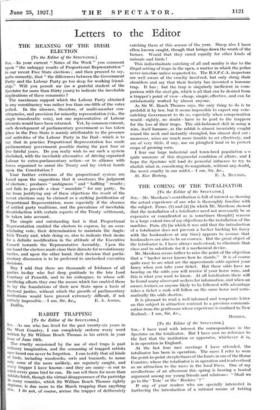RABBIT TRAPPING
[To the Editor of the SPECTATOR.] SIR,—As one who has lived for the past twenty-six years in the West Country, I can completely endorse every word written by Sir William Beach Thomas in his article in your issue of June 18th.
The cruelty occasioned by the use of steel traps is past ordinary imagination, and the screaming of trapped rabbits once heard can never be forgotten. I can testify that all kinds of birds, including woodcocks, owls and buzzards, to name only some of the more unlikely, are regularly caught, and every trapper I have known—and they are many—is out to racatch every game bird he can. He can sell them for more than bbits fetch, though the virtual disappearance of the partridge rnanY counties, which Sir William Beach Thomas rightly deplores, is due more to the March trapping than anything else. I do not, of course, accuse the trapper of deliberately
catching them at this season of the year. Sheep also I have often known caught, though that brings down the wrath of the farmer. Would that they cared equally for other kinds of animals and birds !
This indiscriminate catching of all and sundry is due to the illegal setting of traps in the open, a matter in which the police never interfere unless requested to. The R.S.P.C.A. inspectors arc well aware of the cruelty involved, but only shrug their shoulders and say that their Society has invented a humane trap. It has ; but the trap is singularly inefficient in com- parison with the steel gin, which is all that can be desired from a trapper's point of view—cheap, simple, effective, and can be satisfactorily worked by almost anyone.
As Sir W. Beach Thomas says, the only thing to do is to prohibit it by law, but it seems impossible to expect any vote- catching Government to do so, especially when compensation would—rightly, no doubt—have to be paid to the trappers for the loss of their traps. The old-fashioned skill in using a wire, itself humane, as the rabbit is almost invariably caught round the neck and instantly strangled, has almost died out : moreover, wires arc much more trouble to set effectively, and are of very little, if any, use on ploughed land or to protect crops of growing corn.
I fear our large industrial and town-bred population a -e quite unaware of this disgraceful condition of affairs, and I hope the Spectator will lend its powerful influence to try to abolish what is, considering its magnitude, without any doubt, the worst cruelty in our midst.—I am, Sir, &c.,














































 Previous page
Previous page